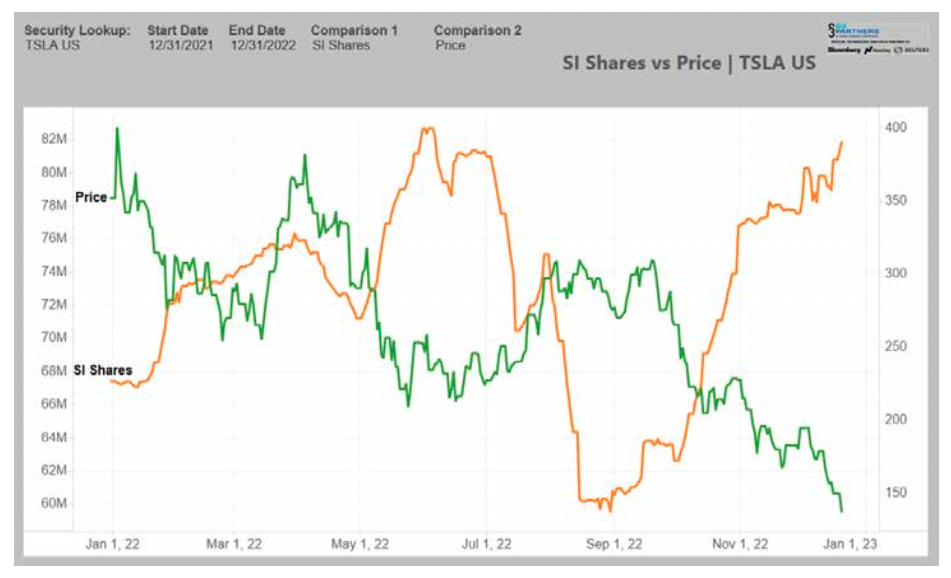Tesla's largest-ever decline has short sellers sitting on $15 billion in profits: Morning Brief
This article first appeared in the Morning Brief. Get the Morning Brief sent directly to your inbox every Monday to Friday by 6:30 a.m. ET. Subscribe
Friday, December 23, 2022
Today's newsletter is by Myles Udland, senior markets editor at Yahoo Finance. Follow him on Twitter @MylesUdland and on LinkedIn. Read this and more market news on the go with the Yahoo Finance App.Yahoo Finance App.
Tesla stock fell another 8.8% on Thursday, bringing its year-to-date losses to 64%.
With this decline, more than $800 billion in market capitalization has been erased from the electric carmaker. The current 69.7% drawdown from its most recent high reached in late 2021 is the largest in Tesla's corporate history.
And this slide has been good news to short-sellers.
Data from S3 Partners published Thursday showed that through Wednesday's close, Tesla was the year's most profitable short — or stock traders were betting against — with mark-to-market profits totaling $15.03 billion so far this year. And these figures don't reflect Thursday's decline.
"In December, TSLA shorts are up $4.54 billion in month-to-date mark-to-market profits, up +33.2% on an average short interest of $13.67 billion," S3 Partners said in its report. "Since Elon Musk’s Twitter bid on 4/14/22, TSLA shorts are up $13.74 billion in mark-to-market profits, up 77.5% on an average short internet of $17.74 billion."

And the next most-profitable short this year isn't even close — short-sellers have made $6.2 billion betting against Amazon in 2022, a stock that was down 49.7% so far this year through Thursday's close.
The notion that Musk's involvement with Twitter is the predominant issue facing Tesla shares has become a widely held view in recent weeks. Consensus, even.
Wall Street analysts have said Musk "needs to pull it together," while slashing price targets and downgrading Tesla along the way. Some of Musk's most ardent defenders have openly begun calling for him to step away from Twitter.
And, to an extent, Musk himself seems to agree, hosting a poll on whether he should step down as Twitter's chief and saying he will resign the post once a replacement is found.
This is all coming as reports indicate Tesla has brought in leaders from its team in Shanghai to help steady U.S. operations while the company is now offering $7,500 rebates to U.S. customers willing to take delivery of some models before the end of this year.
That Musk's attention appears to be lacking at Tesla is not news to Musk.

Meanwhile, the Tesla CEO has tweeted at length about the impact tighter monetary policy from the Federal Reserve is having on all financial assets, Tesla included.
Looking at the success of short-sellers this year, there's little doubt the challenges for markets go beyond the CEO of Tesla having a second job as the CEO at Twitter: Data from S3 Partners also shows shorts are up more than $300 billion in realized and unrealized gains this year.
In a widely-covered exchange on Twitter earlier this week, Musk chided longtime Tesla bull Ross Gerber to read Security Analysis 101 to understand what is happening to Tesla stock.
Musk added in a follow-up tweet: "As bank savings account interest rates, which are guaranteed, start to approach stock market returns, which are *not* guaranteed, people will increasingly move their money out of stocks into cash, thus causing stocks to drop."
As Warren Buffett told Yahoo Finance editor-in-chief Andy Serwer years ago: "Everything in valuation gets back to interest rates."
At the time of Buffett's comments back in 2017, investors were perhaps puzzled why stocks continued to rise so aggressively. Rock bottom interest rates were a helpful guide then. Now, investors face the opposite problem — elevated and still-rising rates are crushing financial assets.
Hedge fund titan David Tepper said Thursday he's still "leaning short" on stocks right now because he believes what central bankers are saying: that interest rates will go higher next year.
For Tesla shorts — and short-sellers across the market — the Fed's plans may remain welcome news. And Wall Street strategists broadly expect bets against the stock market will still work in the first half of 2023.
If an anticipated recession finally pushes the Fed and other central banks to ease off the accelerator, expect stocks to rebound abruptly. And don't expect Tesla to be left out.
Of course, none of this is very "Tesla."
Tesla has been a battleground stock for so many years because the company's ambitions — and the persona of its CEO — have always seemed to transcend mundane market talking points like Fed policy. Boring stocks, not category-definers like Tesla, get pushed around by central banks.
Though perhaps this market moment is telling us something else about the maturation of Tesla, signaling it is now becoming more like every other stock. And in this way offering the bulls a new story, which is that it might simply start fitting in.
What to Watch Today
Economy
8:30 a.m. ET: Personal Income, month-over-month, November (0.3% expected, 0.7% during prior month)
8:30 a.m. ET: Personal Spending, month-over-month, November (0.2% expected, 0.8% during prior month)
8:30 a.m. ET: Real Personal Spending, month-over-month, November (0.1% expected, 0.5% during prior month)
8:30 a.m. ET: PCE Deflator, month-over-month, November (0.1% expected, 0.3% during prior month)
8:30 a.m. ET: PCE Deflator, year-over-year, November (5.5% expected, 6.0% during prior month)
8:30 a.m. ET: PCE Core Deflator, month-over-month, November (0.2% expected, 0.2% during prior month)
8:30 a.m. ET: PCE Core Deflator, year-over-year, November (4.6% expected, 5.0% during prior month)
8:30 a.m. ET: Durable Goods Orders, November Preliminary (-1.0% expected, 1.1% during prior month)
8:30 a.m. ET: Durables Excluding Transportation, November Preliminary (0.0% expected, 0.5% during prior month)
8:30 a.m. ET: Non-Defense Capital Goods Orders Excluding Aircraft, November Preliminary (0.0% expected, 0.6% during prior month)
8:30 a.m. ET: Non-Defense Capital Goods Shipments Excluding Aircraft, November Preliminary (-0.3% expected, 1.5% during prior month)
10:00 a.m. ET: University of Michigan Consumer Sentiment, December final (59.1 expected, 59.1 prior)
10:00 a.m. ET: New Home Sales, November (600,000 expected, 632,000 during prior month)
10:00 a.m. ET: New Home Sales, month-over-month, November (-5.1% expected, 7.5% during prior month)
Earnings
No notable reports scheduled for release.
—
Click here for the latest stock market news and in-depth analysis, including events that move stocks
Read the latest financial and business news from Yahoo Finance
Download the Yahoo Finance app for Apple or Android
Follow Yahoo Finance on Twitter, Facebook, Instagram, Flipboard, LinkedIn, and YouTube
